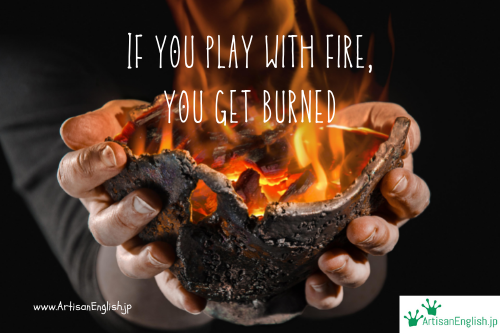
YouTube / iTunes / Spotify / Radio Public / Pocket Casts / Google Podcasts / Breaker / Overcast
Listen to ArtisanEnglish.jp posts & lesson intros here.
Proverb: If you play with fire, you get burned
If you play with fire, you get burned.
It’s a truism we teach to children as soon as they are old enough to play with matches.
Yes, fire is beneficial.
We can accomplish many good things through the careful use of fire.
However, fire is also hazardous, and much damage has been caused by its careless handling.
Today’s proverb contains more profound wisdom than don’t play with fire.
If you play with fire, you get burned means if you fool around with potentially dangerous things, you will eventually be hurt.
I consider myself to be an adventurous guy.
Sure, I was more of a risk-taker in my youth, but even today, I like to have an adrenaline rush from time to time.
There is a list of things that I will never do.
To me, these things seem idiotic, and if you are hurt while doing them, you can expect to be called an idiot by everyone.
Let’s call it my if-you-play-with-fire-you-get-burned anti-bucket-list list.
You’ll find things such as don’t climb active volcanoes on the lists.
You may think this is a no-brainer, but the Japanese do it all the time.
Also on the list is don’t take pictures with live animals that can kill you by biting, stinging, slashing or crushing.
That means no touching tigers in Thailand or swimming with great white sharks in South Africa.
Stingrays, alligators, crocodiles, lions, bears, and wolves are to be left alone at all times.
In addition, snakes of all sizes and large land mammals such as elephants, buffalo, hippos, or anything that can run faster than a 48-year-old white man are to be avoided.
Remember, the reasoning here is if you play with fire, you get burned.
Flesch-Kincaid Readability Test
This post is understandable by someone with at least a 7th-grade education (age 12).
On the Flesch-Kincaid reading-ease test, this post scores 75.
The easier a passage is to read, the higher the score on a scale of 0 – 100.

